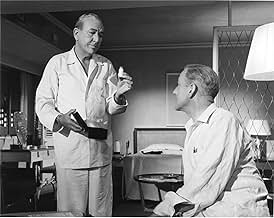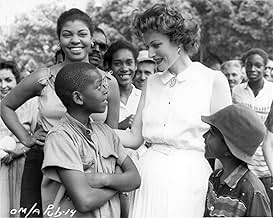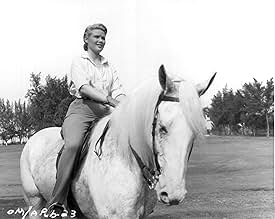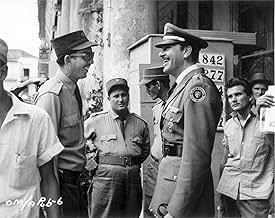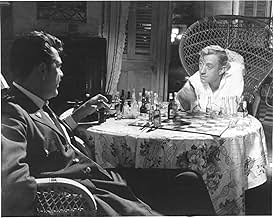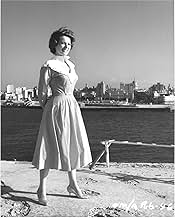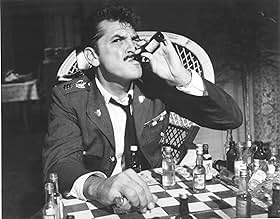IMDb RATING
7.2/10
6.4K
YOUR RATING
Expatriate vacuum cleaner salesman Jim Wormold agrees to work as an agent, and to recruit new agents, for the British Secret Service in Cuba, but he soon realizes that his deceptive ways are... Read allExpatriate vacuum cleaner salesman Jim Wormold agrees to work as an agent, and to recruit new agents, for the British Secret Service in Cuba, but he soon realizes that his deceptive ways are going to get him in trouble.Expatriate vacuum cleaner salesman Jim Wormold agrees to work as an agent, and to recruit new agents, for the British Secret Service in Cuba, but he soon realizes that his deceptive ways are going to get him in trouble.
- Awards
- 2 nominations total
Grégoire Aslan
- Cifuentes
- (as Gregoire Aslan)
Joseph G. Prieto
- Lopez
- (as Jose Prieto)
- Director
- Writer
- All cast & crew
- Production, box office & more at IMDbPro
Featured reviews
Sir Alec is, as always, magnetic. Guinness described himself as someone who liked to put on the mask, preferring to live someone else's life in order to keep his own private. Here his character tries to do something like that, with mixed results.
What is it about Guinness that makes it so hard to take our eyes off him? This role is, in a way, a variation on Col. Nicholson: the simple soul who discovers, a little too late, that he has understood nothing. In both cases their innocent acts start a chain of events that comes close to tragedy (but for Hollywood endings), and yet we never think of blaming either character for what they have brought about.
On the contrary, it's hard not to feel that Wormold deserves all of his undeserved good fortune, which appears to come at no cost. And even after Greene's story dispels that illusion, we still feel that his decency ought to count for something, even if his intentions were less than pure.
You can read this movie as an allegory for the common delusion on the part of great powers that they can direct events to their liking. If so, then Guinness has, even without the tacked on ending, subverted it. And even if we know better, it is hard not to cheer for him.
What is it about Guinness that makes it so hard to take our eyes off him? This role is, in a way, a variation on Col. Nicholson: the simple soul who discovers, a little too late, that he has understood nothing. In both cases their innocent acts start a chain of events that comes close to tragedy (but for Hollywood endings), and yet we never think of blaming either character for what they have brought about.
On the contrary, it's hard not to feel that Wormold deserves all of his undeserved good fortune, which appears to come at no cost. And even after Greene's story dispels that illusion, we still feel that his decency ought to count for something, even if his intentions were less than pure.
You can read this movie as an allegory for the common delusion on the part of great powers that they can direct events to their liking. If so, then Guinness has, even without the tacked on ending, subverted it. And even if we know better, it is hard not to cheer for him.
This movie is a good example of how a story can be carried by the force of the actors' skill and director's art rather than relying the science of special effects. The absence of "action" means that the audience's attention has to be held by the sheer force of the story line, the actors' interpretations of it and the director's presentation of the product as a whole.
It deals honestly with what intelligence gathering is. A mundane craft open to manipulation not only by governments but also by lowly operatives. Sir Alec Guinness, as he later became, portrays the ordinariness of the seedy characters who carry on this trade. Ernie Kovacs gives a splendid presentation of the laid back but sinister not so secret policeman while Burl Ives is as powerful as ever.
The pre-Castro Cuban setting is well portrayed and one can almost feel the tropical heat as the cast of misfit characters go about there subterfuge business.
It deals honestly with what intelligence gathering is. A mundane craft open to manipulation not only by governments but also by lowly operatives. Sir Alec Guinness, as he later became, portrays the ordinariness of the seedy characters who carry on this trade. Ernie Kovacs gives a splendid presentation of the laid back but sinister not so secret policeman while Burl Ives is as powerful as ever.
The pre-Castro Cuban setting is well portrayed and one can almost feel the tropical heat as the cast of misfit characters go about there subterfuge business.
This afternoon I chanced upon this terrific film on Channel 4.I had seen it years ago as a child,and couldn't understand why my father kept referring to the brilliant " Our Man in Havana" Now I know what he meant.Alec Guinness hit the perfect note in the part,as he invariably did.Havana is rendered almost tangible by director Carol Reed, a difficult feat to achieve.The rest of the cast shine too.Ernie Kovacs makes a human being out of his police-thug character.The script seems almost improvised,so fresh , pointed and witty.Compare this movie to the bulk of today's garbage,and prepare to feel very let-down by what you can see at your local Multiplex.This strange and sharp movie has re-affirmed my intention to spend some time in Havana.Buena Vista Social Club first whetted my curiosity.This movie is timeless and a great 2 hrs of entertainment/art.Enjoy! And look at Maureen O ' Hara, is she not quite splendid? !
Comedy and espionage make uneasy bedfellows in this Alec Guinness vehicle. Viewers should expect more of a morality play than a gleeful farce.
Guinness frequently played characters leading double lives. Here we see his character Wormold tripped up by one that may cost him his life. Wormold is a vacuum cleaner salesman in Havana who is approached by a fellow named Hawthorne (Noel Coward), alias Agent 59200, who wants Wormold to serve the British Secret Service "for $150 a month and expenses" as his subagent, 59200/5, collecting secret information regarding pre-Castro Cuba.
Encouragement for this comes not only indirectly from his love for his spendthrift daughter Milly (Jo Morrow) but more directly from his best friend, a castoff German doctor named Hasselbacker (Burl Ives), whose advice forms the heart of the message from screenwriter Graham Greene, adapting his own novel:
"That sort of information is always easy to give. If it is secret enough, you alone know it. All you need is a little imagination...As long as you invent, you do no harm. And they don't deserve the truth."
The joke, which is also the story's tragedy, is Wormold invents too well, convincing not only his London paymasters but the opposition of his fiction's veracity. Director Carol Reed famously made a spy film, "The Third Man," which blended tragedy and comedy in equal measure. This time, the comedy is more front-and-center, but efforts at creating a light tone conflict with the more serious message and various characters' fates. "Our Man In Havana" struggles at times with what kind of film it wants to be.
Perhaps Guinness's own difficulty with his part contributes to this confusion. He reportedly found Reed's instruction ("Don't act!") unhelpful. Ives is especially heavy for the film's most delicate part, making it oppressively sad; I wish that Reed's collaborator Orson Welles could have taken this part and invested it with some of his trademark cunning and craft.
Much of "Our Man In Havana" does work, and well. Oswald Morris's cinematography employs actual Havana locations to great effect, using unusually angled shots of the crumbling, sun-drenched city. You feel the tension of Wormold's world in every scene. Ernie Kovacs, a hero of early TV comedy, gets a lot out of a thanklessly straight part, the menacing but sensitive Segura, who lusts for Milly and explains his position with real sensitivity even though he never loses the cruelty of the character.
"Do you play checkers, Mr. Wormold?" he asks.
"Not very well," answers Wormold.
"In checkers, one must move more carefully than you have tonight."
Wormold isn't kidding; he only knows enough to lose. In a world this topsy-turvy, it proves the right approach.
Coward does much to serve the comedy, which would be almost entirely absent without him. His recruitment of Wormold, which is played like a seedy homosexual liaison in bars and men's rooms, is a riot when one knows not only Coward's own legendary proclivities but his friendship with that master of spy fiction, Ian Fleming. Some of the film is even set in Fleming's own Jamaican stomping grounds; one can imagine the creator of James Bond must have enjoyed this send-up of his work before it was a gleam in Albert Broccoli's eye.
"Our Man In Havana" plays with your mind and conscience for an hour and a half. It capably establishes a dark mood with cheerful undertones though it would have worked better vice versa, which was my takeaway from reading the novel. Anyway, it's intelligent, entertaining, and worth a look.
Guinness frequently played characters leading double lives. Here we see his character Wormold tripped up by one that may cost him his life. Wormold is a vacuum cleaner salesman in Havana who is approached by a fellow named Hawthorne (Noel Coward), alias Agent 59200, who wants Wormold to serve the British Secret Service "for $150 a month and expenses" as his subagent, 59200/5, collecting secret information regarding pre-Castro Cuba.
Encouragement for this comes not only indirectly from his love for his spendthrift daughter Milly (Jo Morrow) but more directly from his best friend, a castoff German doctor named Hasselbacker (Burl Ives), whose advice forms the heart of the message from screenwriter Graham Greene, adapting his own novel:
"That sort of information is always easy to give. If it is secret enough, you alone know it. All you need is a little imagination...As long as you invent, you do no harm. And they don't deserve the truth."
The joke, which is also the story's tragedy, is Wormold invents too well, convincing not only his London paymasters but the opposition of his fiction's veracity. Director Carol Reed famously made a spy film, "The Third Man," which blended tragedy and comedy in equal measure. This time, the comedy is more front-and-center, but efforts at creating a light tone conflict with the more serious message and various characters' fates. "Our Man In Havana" struggles at times with what kind of film it wants to be.
Perhaps Guinness's own difficulty with his part contributes to this confusion. He reportedly found Reed's instruction ("Don't act!") unhelpful. Ives is especially heavy for the film's most delicate part, making it oppressively sad; I wish that Reed's collaborator Orson Welles could have taken this part and invested it with some of his trademark cunning and craft.
Much of "Our Man In Havana" does work, and well. Oswald Morris's cinematography employs actual Havana locations to great effect, using unusually angled shots of the crumbling, sun-drenched city. You feel the tension of Wormold's world in every scene. Ernie Kovacs, a hero of early TV comedy, gets a lot out of a thanklessly straight part, the menacing but sensitive Segura, who lusts for Milly and explains his position with real sensitivity even though he never loses the cruelty of the character.
"Do you play checkers, Mr. Wormold?" he asks.
"Not very well," answers Wormold.
"In checkers, one must move more carefully than you have tonight."
Wormold isn't kidding; he only knows enough to lose. In a world this topsy-turvy, it proves the right approach.
Coward does much to serve the comedy, which would be almost entirely absent without him. His recruitment of Wormold, which is played like a seedy homosexual liaison in bars and men's rooms, is a riot when one knows not only Coward's own legendary proclivities but his friendship with that master of spy fiction, Ian Fleming. Some of the film is even set in Fleming's own Jamaican stomping grounds; one can imagine the creator of James Bond must have enjoyed this send-up of his work before it was a gleam in Albert Broccoli's eye.
"Our Man In Havana" plays with your mind and conscience for an hour and a half. It capably establishes a dark mood with cheerful undertones though it would have worked better vice versa, which was my takeaway from reading the novel. Anyway, it's intelligent, entertaining, and worth a look.
Although most Americans have little knowledge of his work other than Star Wars, Alec Guinness produced an amazing body of work--particularly in the 1940s-1950s--ranging from dramas to quirky comedies. I particularly love his comedies, as they are so well-done and seem so natural and real on the screen--far different from the usual fare from Hollywood.
This spy farce is about a man who is a paid spy in Cuba during the latter years of the Batista regime. The problem is, he has absolutely no idea what he is doing and is in way over his head because he is NOT a trained spy--just some guy dumped into the role despite his objections. So how do you think he should deal with this dilemma? Of course, make up EVERYTHING and pretend you are doing your job. The problem is, he is too good at it and the lies take on a life of their own! This comedy is a bit silly at times and unbelievable compared to some of his earlier work, but it is still an excellent film. Don't be put off by mediocre reviews that came out since its release--it's well worth your time.
This spy farce is about a man who is a paid spy in Cuba during the latter years of the Batista regime. The problem is, he has absolutely no idea what he is doing and is in way over his head because he is NOT a trained spy--just some guy dumped into the role despite his objections. So how do you think he should deal with this dilemma? Of course, make up EVERYTHING and pretend you are doing your job. The problem is, he is too good at it and the lies take on a life of their own! This comedy is a bit silly at times and unbelievable compared to some of his earlier work, but it is still an excellent film. Don't be put off by mediocre reviews that came out since its release--it's well worth your time.
Did you know
- TriviaFidel Castro's government gave permission for this movie, which presents the fallen regime of Fulgencio Batista in an unflattering light, and also condemns American and British meddling, to shoot on-location in Havana, only a few months after the revolution. It was completed during the brief period in 1959 before Cuba had aligned itself with the Soviet Union.
- GoofsAt the end of the film,the aerial footage of the Tower of London has been flipped, resulting in Tower Bridge being on the West of the Tower of London and all traffic driving on the right.
- Quotes
Capt. Segura: Some people expect to be tortured, others are outraged by it.
- ConnectionsFeatured in The South Bank Show: Sir Alec Guinness (1985)
- SoundtracksLA BELLA CUBANA
(uncredited)
(traditional Cuban melody)
Composed by José Silvestre White Lafitte (1853)
used as love theme in the opening credits
- How long is Our Man in Havana?Powered by Alexa
Details
- Release date
- Country of origin
- Official sites
- Languages
- Also known as
- Nuestro hombre en La Habana
- Filming locations
- London, England, UK(Paraliament Square)
- Production company
- See more company credits at IMDbPro
Box office
- Gross worldwide
- $114
- Runtime1 hour 51 minutes
- Color
- Aspect ratio
- 2.35 : 1
Contribute to this page
Suggest an edit or add missing content



